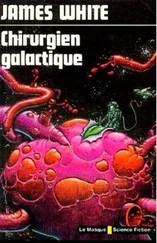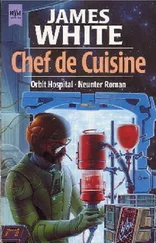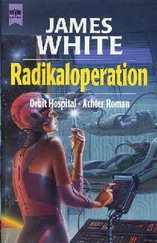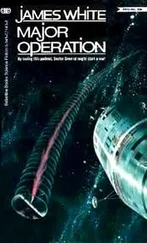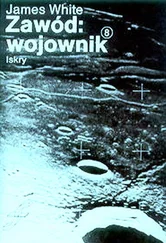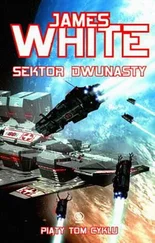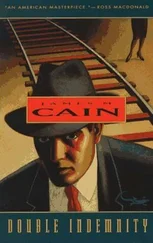It was strange, Murchison thought, that all of the civilized species known to the Federation had this aversion to eliminating body wastes in public, or to witnessing the activity in others. When she had washed and eaten — she was so hungry that the food tasted horrible but on the plus side of inedible — she dissolved a small amount of the food in the remains of the washing-water and with the corner of a cloth daubed two simple sketches on the sunlit wall. Then she put her head around the side of the doorway and beckoned for the spider to come back inside.
It was time to start talking.
But her guard had other ideas. It spat accurately onto the knot holding the other end of her restraining rope, dissolving the seal, then made it into a tight coil which it grasped in one claw. With the other one it indicated its crossbow and quiver before it began tugging on the rope.
Politely she was being told to follow it, or else.
In the event, she had no need to worry because it became clear that her guard was showing her over the ship while giving the hundred or more crew members a chance to look her over. They pointed, waved limbs, and chittered excitedly at her, their body language reflecting intense curiosity. But a quiet, clicking sound from her escort made them keep their distance. She guessed that her spider was a superior officer of some kind and that it was showing off a strange and interesting specimen that it wished to keep as comfortable, if not as happy, as possible. Murchison could live with that, especially as the technology of the ship itself was so strange and interesting.
In a first-contact situation, curiosity that was strong enough to overcome xenophobia in both parties was a very good sign.
The vessel looked even larger inside than out. Its smooth outer shell contained a structure that was like a complicated three-dimensional maze. She estimated it to be about eighty meters from prow to stern, sixty in the beam, and thirty to the highest point of its turtlelike upper works which, so far as she co^ld see, enclosed five or six levels of decking that were stepped back sharply so as to be covered by a segmented outer shell that could be opened in whatever area and number was required, to become sails and furnish highly directional wind propulsion. The overall structural material must have been very light because, in spite of its top-heavy appearance, the vessel rode very high in the water.
She wasn’t surprised to find that the two decks that were on and just above the water line had no sail openings, ventilation, or natural lighting. The compartments on those levels were large and filled with coils of rope, netting, and masses of eel-like creatures, some of which were still twitching, that smelled like fish. She was glad when her escort guided her back towards the fresh air and sunlight of the upper decks.
But there was a steadily diminishing supply of fresh air, she realized, and no sunlight at all. She was pushed gently against a bulkhead and signaled to stay out of the way because it appeared that the entire crew were moving about and working furiously to wind in all of the sail segments and seal their outer shell. Just before the section beside her closed to admit only a narrow band of light, she was able to see the probable cause of all the frantic activity.
The sun had been covered by the dark grey curtain of a rain squall that was running in from the sea.
On the way back to her compartment Murchison had a lot to think about. This and the other two vessels she had seen must be part of a fishing fleet that needed aerial reconnaissance to direct them towards the shoals they trawled. The sails they used for guidance and propulsion had to double as shelters in the event of a storm or even a rain shower because, perhaps like cats and Kelgians and certain other furred species in her experience, it was physiologically dangerous for them to get wet.
These ships were manned, for want of a better word, by very brave sailors indeed.
Back in her room the ventilator had been closed to admit a narrow band of light and none of the heavy rain that was rattling against the hull. The spider pointed to a formerly empty shelf. During their absence someone, probably acting on its instructions, had left them a small stack of wide, pale yellow dried leaves a thin, short-handled brush, and a small wooden container of what looked like ink.
Considering the spider-hostile weather outside, she thought again, this was a very good time to begin talking.
Using its power-hungry tractor beams in reverse rather than the noisy thrusters, Rhabwar had come in low and quiet to transfer Prilicla and the Trolanni casualties to the station before returning as it had come, to orbit where the captain would be able to watch the spider ships without them seeing him, or if they did, they wouldn’t know that the new star in their sky was watching them.
“There are three vessels,” it reported simultaneously to the med station and the waiting courier vessel, “but all are stationary with their bows resting on the beach. Five gliders are flying around them at low altitude, too low for the med station to spot them. A number of ship’s personnel have been moving about on the beach and under the nearby trees, but too few, I feel sure, for them to be mounting an attack. In any case, the personnel concerned and the gliders went back on board their ships about ten minutes ago and just before a rain cloud blotted out the area.
“Doctor,” it added, “have you any medical or other developments that you want me to relay to Courier Two?”
“None, friend Fletcher,” Prilicla replied.
'None?” the other said. “What about your missing pathol-°gist? What’s the shape-changer doing about finding her? With
the increased number of casualties I should think her presence is desirable right now.”
“It is…” he began, when Naydrad, who had been assisting him with Keet’s treatment, answered for him in its usual tactless disregard for the fact that the listening patient was wearing a translator.
“It is not desirable, Captain,” it broke in; “it is necessary. Physiologically the Trolanni are an unusually complex life-form. This one will survive but its mate will almost certainly not, unless Murchison, who is a specialist in other-species pathology, returns to us soon. We are all concerned for her safety and the possible loss of her unrivaled expertise.”
Unlike the Kelgian, who could not help saying exactly what it was thinking at any time, the captain tried to be more circumspect.
“Your medical team is two members short,” it said gently, “and Danalta would be of more use to you there than remaining in the vicinity of the bay. What I’m trying to say is that Pathologist Murchison may not be returning to you. Isn’t that a strong possibility, Doctor?”
Prilicla felt a tremor shaking his limbs and body, the significance of which Naydrad, but not Keet, would understand. He controlled his emotions with difficulty and stilled his body before he was able to speak.
“It is a possibility, friend Fletcher,” he said, “but I hope that it is a remote one. Danalta lost contact with Pathologist Murchison shortly after its capture and while it was still on the ground rescuing the communicator. The shape-changer has since been trying to discover the ship to which friend Murchison was taken and where within that ship it is being held, so far unsuccessfully-
“I shall not call off this search,” he went on, “because I have known Pathologist Murchison for many years. I know its personality, its warmth, sympathy, humor, its sensitivity, and in particular the intensity of feeling it holds for its life-mate, and many other qualities that cannot be put into words. Of even more irnportance, I know its emotional-radiation signature almost as well as I know my own.
Читать дальше

